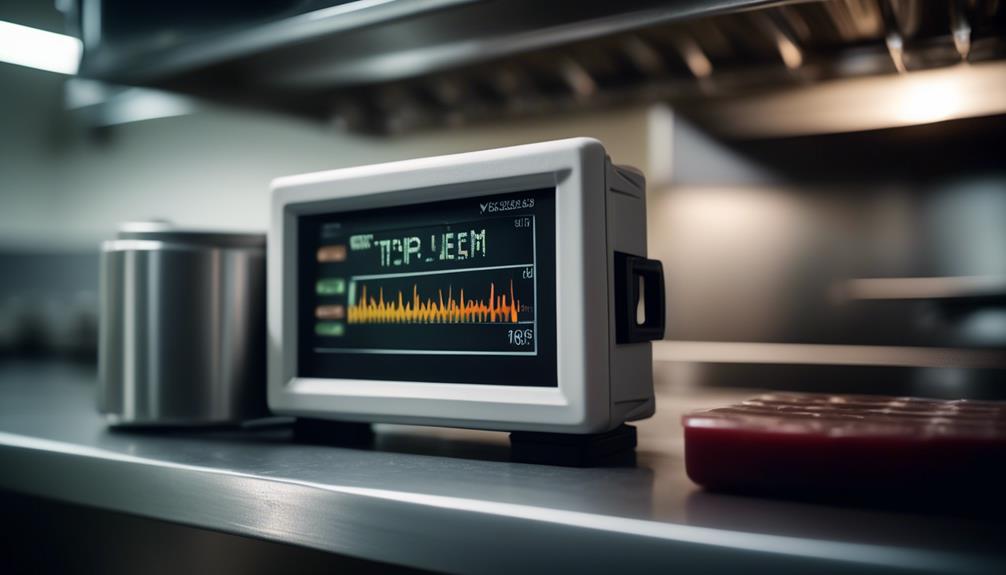I’ve seen it all in the field of temperature monitoring, and let me tell you, temperature data loggers are the real game-changers.
These little devices have completely transformed industries worldwide, bringing precision and accuracy to temperature-sensitive environments like never before.
From food to vaccines, crops to chemicals, temperature data loggers ensure product quality and compliance with regulations.
Join me as we explore the countless benefits and applications of these revolutionary tools that are reshaping the way businesses operate.
Benefits of Temperature Data Loggers
Temperature data loggers provide numerous benefits in various industries. With advancements in temperature data loggers, businesses can now more accurately monitor and control temperature-sensitive environments. These devices have become essential tools in ensuring product quality and compliance with standards and regulations.
In the future, we can expect to see even more innovative features and capabilities in temperature data logging technology. For example, there may be advancements in wireless connectivity, allowing for real-time monitoring and remote access to temperature data. Additionally, data loggers may become more compact and portable, making them easier to use in various settings.
As industries continue to rely on temperature-sensitive processes, the future trends in temperature data logging will undoubtedly focus on improving accuracy, efficiency, and convenience.
Industries Transformed by Temperature Data Loggers
With advancements in temperature data loggers, businesses can now more accurately monitor and control temperature-sensitive environments, transforming industries in the process. The impact of temperature data loggers on environmental sustainability is significant.
By ensuring optimal temperature conditions, companies can minimize waste, reduce energy consumption, and decrease their carbon footprint. For example, in the food industry, temperature data loggers help prevent spoilage, leading to less food waste and a more sustainable supply chain.
Additionally, the integration of temperature data loggers in IoT systems allows for real-time monitoring and remote access to temperature data. This enables businesses to quickly identify and address temperature fluctuations, ensuring product quality and safety.
As a result, industries such as pharmaceuticals, healthcare, and logistics have greatly benefited from the transformative power of temperature data loggers.
Factors Influencing Data Logger Selection
When selecting a data logger, it’s important to consider several factors that can influence its suitability for a specific application. One crucial aspect to keep in mind is data logger maintenance tips. Regular maintenance ensures the proper functioning and accuracy of the logger over time. This includes cleaning the sensors, checking the battery life, and calibrating the device if necessary.
Additionally, challenges in data logger implementation should be considered. Factors such as environmental conditions, data transfer capabilities, and compatibility with existing systems can all present potential hurdles. It’s important to thoroughly evaluate these challenges and ensure that the chosen data logger can overcome them effectively.
How to Effectively Use Temperature Data Loggers
To effectively use temperature data loggers, I configure the device with the necessary parameters using a communication interface and companion software.
Here are the best practices for using temperature data loggers:
- Troubleshooting Issues:
- Ensure proper placement of the logger to get accurate readings.
- Check the battery life and replace if necessary.
- Verify that the logger is calibrated correctly.
- Make sure the communication interface and software are up to date.
- Data Analysis Best Practices:
- Use statistical analysis to identify trends and anomalies in the data.
- Compare the logged temperature readings with the desired temperature range.
- Monitor the data in real-time to detect any temperature deviations.
- Create visualizations and reports to communicate the findings effectively.
Key Considerations for Choosing a Data Logger
When choosing a data logger, it’s important to consider key factors that will meet the specific needs and requirements of your application.
Data loggers have a wide range of applications and offer several advantages. They’re used in temperature-controlled environments, both indoors and outdoors, as well as during transit. Data loggers are essential for handling temperature-sensitive products in industries such as food, vaccines, crops, livestock, chemicals, and museums. They’re also used in laboratories, R&D, diagnostics, and the warehouse and logistics industry.
By using data loggers, you can maintain product quality, comply with standards and regulations, and ensure the safety of temperature-sensitive items.
When choosing a data logger, it’s crucial to consider factors such as the type of data needed, memory capacity, single-use or multi-use options, and user-friendly software for configuration, data download, and analysis.
Read More:
Revolutionary Active Tracking Maximizes Meat Shelf-Life
Revolutionizing Pharmaceutical Supply Chains: Compliance Unveiled
Unveiling the Secrets to Perfect Perishable Compliance
Revolutionary Track & Trace Solutions Protect Pharmaceutical Integrity
Privacy Policy
Importance of Battery Life and Display in Data Loggers
With a data logger, I rely on its battery life and display to ensure accurate and efficient monitoring of temperature-sensitive items. The battery life of a data logger is crucial because it determines how long the device can operate without needing to be replaced or recharged. A longer battery life means less downtime and more uninterrupted data logging.
Additionally, a data logger with a display allows for quick and easy access to important information without the need to connect to a computer. This is especially beneficial when monitoring temperature-sensitive items in real-time and making immediate adjustments if necessary.
The benefits of data analysis with temperature data loggers are immense, as it allows for the identification of trends, anomalies, and potential issues in temperature-sensitive environments. This can greatly impact supply chain management by ensuring proper handling, storage, and transportation of temperature-sensitive goods, ultimately reducing waste and improving overall product quality.
Size and Weight Considerations for Data Loggers
One important aspect to consider when selecting a data logger is its size and weight. In transportation, the advantages of using temperature data loggers are significant. These loggers ensure that temperature-sensitive products, such as food or vaccines, are stored and transported under optimal conditions.
The small and lightweight design of data loggers allows for easy placement and monitoring in various vehicles, ensuring that temperature fluctuations are accurately recorded.
However, challenges arise when implementing data loggers in healthcare facilities. The size and weight of the loggers need to be taken into account, as they may need to be placed in tight spaces or carried by healthcare professionals.
Finding loggers that are compact and portable, while still maintaining accurate temperature monitoring capabilities, is crucial in overcoming these challenges.



